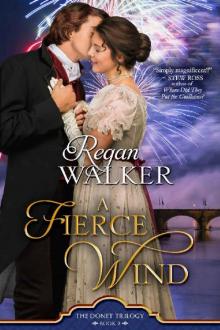- Home
- Regan Walker
The Shamrock & the Rose
The Shamrock & the Rose Read online
The Shamrock & The Rose
Regan Walker
Copyright 2013 Regan Walker
Smashwords Edition
The Shamrock & The Rose
A stint playing Portia at the Theatre-Royal at Haymarket in London, a dropped valentine and a dangerous desire lead gentle-born Rose Collingwood into the arms of an Irishman whose love will hazard all she knows and is.
The Shamrock & The Rose
Regan Walker
www.BOROUGHSPUBLISHINGGROUP.com
PUBLISHER’S NOTE: This is a work of fiction. Names, characters, places and incidents either are the product of the author’s imagination or are used fictitiously. Any resemblance to actual events, locales, business establishments or persons, living or dead, is coincidental. Boroughs Publishing Group does not have any control over and does not assume responsibility for author or third-party websites, blogs or critiques or their content.
THE SHAMROCK & THE ROSE
Copyright © 2013 Regan Walker
All rights reserved. Unless specifically noted, no part of this publication may be reproduced, scanned, stored in a retrieval system or transmitted in any form or by any means, electronic, mechanical, photocopying, recording, or otherwise, known or hereinafter invented, without the express written permission of Boroughs Publishing Group. The scanning, uploading and distribution of this book via the Internet or by any other means without the permission of Boroughs Publishing Group is illegal and punishable by law. Participation in the piracy of copyrighted materials violates the author’s rights.
Digital edition created by Maureen Cutajar
www.gopublished.com
ISBN 978-1-938876-41-7
To my great grandfather from Ireland who by all accounts was quite the rake yet managed to win my great grandmother’s heart.
Contents
Title Page
Copyright
Dedication
Epigraph
The Shamrock & The Rose
Author’s Note
Author Bio
There’s a dear little plant that grows on our isle,
’Twas St. Patrick himself sure that set it;
and the sun on his labour with pleasure did smile,
and with dew from his eye often wet it.
It shines thro’ the bog. Thro’ the brake, and the mireland;
and he called it the dear little shamrock of Ireland.
—from “The Green Little Shamrock of Ireland” by Andrew Cherry
…how beautiful my English rose
how strong this feeling pines
at my thoughts into my soul
here is a beauty unlike any other
tenderly sweet before my eye
I could hold this picture forever
and forever love my English rose
—from “English Rose” by Matthew Holloway
The Shamrock & The Rose
“Who chooseth me must give and hazard all he hath.”
—from The Merchant of Venice by William Shakespeare
London, February 1818
Morgan O’Connell hardly noticed Sophie as she turned her attention from the stage and artfully tossed her head of dark curls, smiling at him from behind her lace-covered fan. He was tired of his companion’s feigned shyness and coquettish glances, just as he was tired of the play they would be seeing. The Merchant of Venice, though just beginning, held little interest for him. Once a favorite, he supposed he’d seen too many bad productions for it to remain so. Still, he liked the ambience of the Theatre-Royal at Haymarket, which seemed the place he most often sought entertainment now that he lived in London. Sophie seemed to be enjoying it, too.
His gaze drifted to the stage where appeared the three chests from which Portia’s suitors must choose, her dead father having left a puzzle to determine which man would gain both his daughter and his wealth. Gold, silver and lead; only one held the prize. And the cost to hazard a guess was high, for those who failed must vow never to wed.
As the play unfolded, Morgan’s eyes soon diverted from the chests to the woman acting the part of Portia. She was beautiful and young, somewhere between nineteen and twenty-one. Though he couldn’t tell if that luxurious long brown hair was the actress’s own, the sixteenth-century gown was most becoming to her curves. Her acting was extraordinary, holding him enraptured and sweeping him into a story he’d thought no longer held any allure. Small movements of her eyes, facial expressions and gestures conveyed much that Shakespeare’s lines did not. If she’d never spoken a word, he would have known Portia’s true heart. When she did speak, he believed in a real Portia of long ago.
Ignoring his female companion, Morgan leaned forward. “A superb Portia, Roger, would you not agree?”
“She’s captured my attention,” his friend whispered, likely so Judith Seaton sitting next to him would not hear. Judith was a new love interest, and Roger had been trying to impress her. “I’ve heard she is fresh to the stage but already drawing many compliments.”
“Remind me who she is,” Morgan said in a voice too low for Sophie to hear.
“Lily Underwood, as I recall the playbill.”
Morgan nodded and sat back, relieved that Sophie had again taken up her study of the audience below. It was clear she was more a follower of the haut ton than a devotee of Shakespeare.
From his box above the stage, Morgan could see well the actors moving about below. His eyes lingered on the woman portraying Portia, the one he now knew as Miss Underwood. She had a compelling voice, one that deepened as the character she portrayed donned the guise of a man to adroitly argue the points of law that would save her lover’s friend while cleverly entrapping the moneylender who demanded Antonio’s flesh.
Leaning forward, he listened as she spoke the lines that were his favorites:
“The quality of mercy is not strain’d.
It droppeth as the gentle rain from heaven
Upon the place beneath. It is twice blest:
It blesseth him that gives and him that takes.”
Portia was the kind of woman Morgan wanted: brave, forthright and intelligent, a woman whose spirit was equal to his own. Unfortunately, these were not qualities he’d find in an English actress, however comely. And though he might consider a tryst with such an actress, his Irish family would only be satisfied with an Irish bride.
* * *
The next morning, in a place as far from the theatre as the nobility was from the rabble, Rose Collingwood seated herself in the parlour of the Dowager Countess of Claremont’s home, on the end of the sofa nearest the blazing fire. She was glad for warmth on the chilly February day. Across a small oval table set with tea, the dowager countess, elegantly gowned as always, set down her cup.
“My dear,” said the silver-haired woman, “I meant to ask when you came in last night, how is the performance going? Do you still believe it was the right thing to accept the part despite your mother’s objections?”
“Oh, the play is going splendidly—and yes, I am happy with my decision. I could not stay in Newcastle another moment.”
“Was it really so bad?”
“It was the future that caused me despair. I might be the daughter of Vice Admiral Lord Collingwood, but there was nothing for me at home save a marriage to some vicar or rising merchant. Had he lived, my father might even have pressed some fellow officer on me. Any of those seemed a dreary choice.”
“Your two sisters appear happy with their lives.”
Rose acknowledged to herself the truth of the countess’s statement while wondering how to explain their differences. “My sisters are much older than I am; they have been wives and mothers for many years, never questioning their place.” She sighed and lifted her tea. He
r sisters were more like distant aunts. “They hardly understand my desire to see more of the world than the north of England. I have often thought I may be more like my father. His military service for the Crown took him to far-off lands.”
“But an actress?”
Rose couldn’t help but note the countess’s disapproving tone. Though she had participated in the deception that allowed Rose to become Lily Underwood, the older woman retained the view of most of the ton. Rose, on the other hand, was quite determined.
“I never thought of it until Mr. Colman from the theatre at Haymarket heard my dramatic reading at a dinner party in Newcastle and made me the offer. The role of Portia was just too marvelous to decline.”
“Well, I am glad Mr. Colman agreed to your wearing a wig and taking a stage name. Your mother was right to insist upon that. Actresses have a questionable reputation at best, and a low one more often, which is why I was pleased she required you stay with me. You must promise to be careful around the theatre people, my dear. One can only imagine the things you might be exposed to.”
Rose felt her cheeks heat at the reminder of the kindness and concern for her welfare her mother’s dear friend had shown her. She never would have been allowed to come to London had not the countess stepped in to offer her home and guidance. Rose had indeed seen a few things backstage that opened her innocent eyes to the darker side of theatre life, and to the loose morals of many of the women there, things that made her determined to wed a gentleman if ever she married at all. But she would not mention those incidents to the countess. Instead she said, “I have heard some actresses have done very well for themselves.”
“Ah, yes. There have been exceptions. The actress Mary Bolton became Lady Thurlow, a worthy countess for Edward. She has given him three fine sons, and I am proud to call her friend.” A faint smile crossed the countess’s face. “I do love interesting people, you know, and she is one of them.” The countess paused, her teacup suspended above its saucer. “Now that I think of it, she was also the daughter of a naval officer, though not as high ranking as your father.”
“I’m not seeking to marry a peer, Countess, or indeed, anyone. I merely want to play the part of a woman I would like to be, one who uses her mind and not her charms. Portia was more than people thought her to be. She didn’t quite fit, and often I feel…well, neither do I.”
“A bluestocking in disguise was fair Portia.” Picking up the quizzing glass that was ever around her neck and peering through it, the countess added, “Not unlike you, I think.”
Rose’s eyes fell to the teacup she held in her lap. “That I cannot say. Coming to London for the stage is the bravest thing I’ve ever done.”
“All to the good, my dear,” said the countess. “I am delighted to have so intelligent a companion in my home, though alongside has come a threefold increase in mail. Humph! All those letters to ‘Miss Underwood’ my footman retrieves from the theatre. And then the calling cards for Miss Collingwood piled so high they are falling off the salver. Why, it’s positively astounding the hearts you’ve won—both as yourself and in the guise of another!”
“Don’t forget the flowers,” Rose said, feeling her mouth twitch up on one side.
The countess’s gaze flitted about the room to the vases holding the bouquets of roses, and she, too, appeared to be fighting a grin. “The gentlemen who sent them surely spent a lot of coin. The scent of these hothouse flowers fairly makes one swoon. You would think someone died.”
“It is rather overpowering,” Rose agreed with a smile.
“Each time there is a delivery, I hear poor Cruthers sigh.”
So many flowers! No longer able to restrain their laughter, both Rose and the countess gave in to a hearty and somewhat undignified guffaw. Even better, Rose enjoyed seeing the decorous older woman allow herself a moment of levity.
* * *
Morgan stepped out of Fribourg & Treyer’s tobacco shop and tucked the small package into his pocket, hoping he’d found the perfect snuffbox for Uncle Maurice’s birthday. A sharp wind stirred the dust of the street, and he pulled his greatcoat tighter about him and set his mind to meeting Roger for a light repast.
Taking another step, he heard a muffled crackle sound from below his boot on the pavement. Looking down he saw an envelope. Curious, he picked it up, brushed off the dust and smoothed the paper. Inscribed in two lines was the intended recipient’s name and address:
Miss Lily Underwood
Theatre-Royal Haymarket
Into his mind came the picture of a woman in a sixteenth-century gown moving gracefully across a stage. The actress from The Merchant of Venice. The woman who was now never far from his thoughts.
Discovering the note unsealed, Morgan paused for a moment and then opened the missive, thinking to learn if the matter was one that required posthaste resolution. He had not planned a trip to Haymarket anytime soon, let alone to deliver an actress’s misplaced mail.
He had only to read a few lines to realize the contents were of no great import. It was one of those love notes Roger had reminded him were becoming all the fashion in London: a valentine. He had paid the custom little attention.
My dear Miss Underwood,
fairest rose,
I’ve watched you at each performance.
You are more beautiful than any other,
with skin that glows like a pearl,
and a smile that brings to mind a distant memory.
I want to gaze upon your face forever.
And I shall…
for soon you will be mine!
Ah, he reminded himself, tomorrow was St. Valentine’s Day. Perhaps some lovesick fool set forth these flowery words hoping to win the actress’s favor. Though, as Morgan read the note a second time, it seemed to him the author’s words were a bit possessive. In the final line, “will” was underscored five times. Perhaps Miss Underwood was the type of lover to inspire such ferocity, if indeed the pair was already acquainted.
Morgan considered what to do with the note. Unsigned, he could hardly return it to its author. He might deliver it, though, and meet this paragon of beauty. Given the words the man had written, Morgan was more curious than ever to see the fair Lily Underwood in person. He might even seduce the comely actress if she was not already spoken for. Perhaps because of her performance, he had last night declined the charms of Sophie.
Slipping the note into his pocket, he smiled. That was just what he would do.
* * *
The next morning Morgan took his uncle’s coach to the theatre. His timing was superb. After asking the driver to wait, he approached the entrance just as a liveried servant stepped from an elegant carriage and entered the theatre. To an attendant the servant said, “I’m here for Miss Underwood’s mail.”
Morgan was taken aback. At first he thought to stop the man and give him the note he’d found, but he hesitated. Given the attire of the servant, he was tempted to follow and see exactly where Miss Underwood lived. Deciding that was more in keeping with his desire, he returned the note to his pocket.
He waited while the attendant disappeared and returned with a stack of correspondence. The servant accepted the pile of letters and turned to leave, and Morgan quietly followed. But the route taken was circuitous, and Morgan’s intrigue only grew as the other carriage wended its way through London.
At last the carriage disappeared behind a grand estate. Climbing down, Morgan paused in front of his own conveyance and looked up. The four-story house was an impressive edifice with tall columns and rows of windows on each floor surrounded by gardens. Roger had pointed it out once when they were riding by. Claremont House. The home of the dowager countess.
Surely no common actress dwelled within, so why was Miss Underwood having her mail delivered here? His curiosity rising to a new level, Morgan passed through the iron gate and took the stairs to the front door, determined to meet the woman who inspired the poetry he carried in his pocket.
At the second drop of the br
ass knocker the door opened and an older, well-attired butler appeared. Half expecting to be turned away, Morgan handed him his card saying, “Mr. O’Connell to see the countess if she is receiving visitors. I have a message for Miss Underwood.”
A flicker of surprise crossed the old butler’s face, but it quickly vanished. “I will inquire if the countess will see you.” Taking Morgan’s hat, the butler bade him enter. “Please wait here.”
He had only begun to look around the grand entry hall, noting the silver salver on a small table piled high with calling cards, the crystal chandelier above him and the gilded staircase winding to the second floor, when the butler returned. “The countess will receive you in the parlour. Please follow me.”
Morgan was delighted.
He arrived at the door of the sitting room to see an older woman on one of two sofas flanking a white marble fireplace. She was a vision of simple elegance in a lapis blue gown with lace at the neckline, a long string of pearls and a quizzing glass on a gold chain her only adornments.
“Mr. O’Connell,” she said, holding out her hand.
He bowed over it. “Lady Claremont. Thank you for seeing me without notice.”
“Please sit down, Mr. O’Connell. Cruthers said you came with a message for Miss Underwood?”
Morgan lowered himself onto the sofa opposite, noticing the anxiety on the older woman’s face and the strong aroma of flowers in the room. His gaze lingered for a moment on a large bouquet of roses, a profusion of scarlet set against a window, before he said, “Yes, one I found quite by happenstance as I was leaving Fribourg and Treyer’s tobacco shop.”
“How did you know Miss Underwood would be here to receive it?”
“Oh, I did not initially. I went to the theatre to return the note, and your servant was just leaving with her mail. I thought to follow him.”
“I see. Very inventive, Mr. O’Connell. Are you in the habit of pursuing young ladies in such a manner?”

 Summer Warrior (The Clan Donald Saga Book 1)
Summer Warrior (The Clan Donald Saga Book 1) Echo in the Wind
Echo in the Wind Once Upon a Christmas Past
Once Upon a Christmas Past A Secret Scottish Christmas (Agents of the Crown Book 4)
A Secret Scottish Christmas (Agents of the Crown Book 4) The Holly and the Thistle
The Holly and the Thistle Racing with the Wind (Agents of the Crown)
Racing with the Wind (Agents of the Crown) Wind Raven (Agents of the Crown)
Wind Raven (Agents of the Crown) Rebel Warrior (Medieval Warriors #3)
Rebel Warrior (Medieval Warriors #3) King's Knight (Medieval Warriors Book 4)
King's Knight (Medieval Warriors Book 4) The Twelfth Night Wager
The Twelfth Night Wager The Red Wolf's Prize
The Red Wolf's Prize The Shamrock & the Rose
The Shamrock & the Rose A Fierce Wind (Donet Trilogy Book 3)
A Fierce Wind (Donet Trilogy Book 3) Against the Wind (Agents of the Crown Book 2)
Against the Wind (Agents of the Crown Book 2)